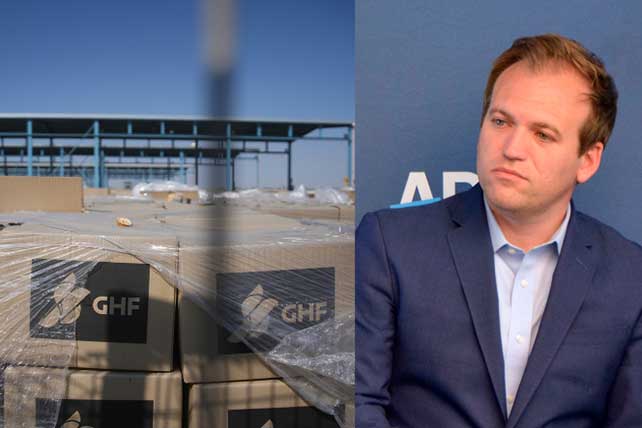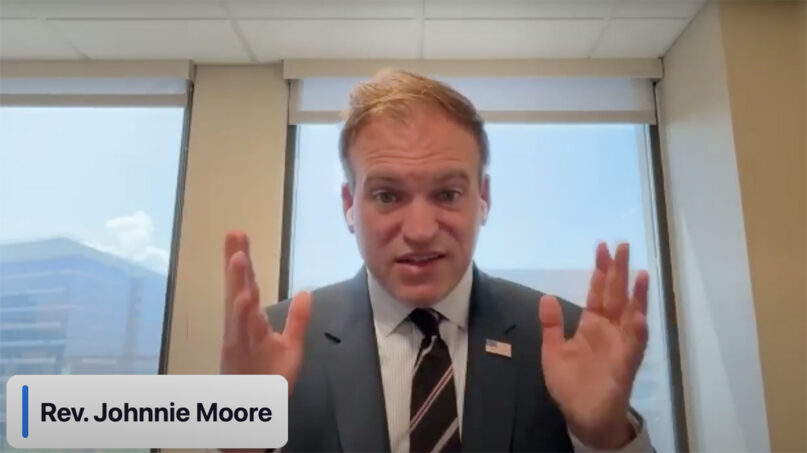GHF has repeatedly rejected claims of deliberate shootings, saying Aguilar was a disgruntled subcontractor dismissed for misconduct and disputing his claims. (Aguilar denies this.) Moore told RNS without offering specific evidence that he believes Doctors Without Borders is “compromised by Hamas.” He has made similar claims about the U.N. and other aid groups, arguing they exacerbated conditions in Gaza rather than making them better. He also told RNS that GHF is not responsible for the deaths near feeding sites.
Critics and supporters alike insist Moore’s involvement in the Middle East comes from a sincere place, but like Davie, they point out that the moral and geopolitical stakes facing Moore are radically higher at GHF.
“I have always found Rev. Johnnie Moore to be a person of goodwill,” wrote the Rev. Mae Cannon, executive director of Churches for Middle East Peace, in an email to RNS, “which is why I am confounded by his inability to see the incredibly problematic reality of the militarization of aid through the Gaza Humanitarian Foundation. As a pastor and Christian leader, I hope Rev. Moore will open his eyes to the reality of the ineffectiveness and devastating harm being caused by the GHF toward innocent civilians in Gaza.”
Adam Nicholas Phillips, a pastor and former USAID staffer who now is CEO of Interfaith America, has known Moore for years. He suggested the GHF faces an impossible task. Calling Moore “a sincere defender of human rights and the most vulnerable,” Phillips said that with the destruction of dependable humanitarian aid institutions, programs and partnerships, “the work of GHF was always going to be beyond challenging.”
Moore has long had a penchant for taking on “impossible missions,” said Luke Moon, executive director of the Philos Project, a pro-Israel evangelical group, who befriended Moore about a decade ago while raising money to help fund charter flights for Christians out of ISIS-controlled Iraq.
In that crisis, Moore’s skills proved essential for raising awareness and motivating people to give to the cause. That kind of awareness could be used for addressing any kind of crisis, said Moon. “He’s a PR guy,” said Moon. “He comes by it naturally.”
Moon said that working in the Middle East, particularly during the Israeli-Palestinian conflict, is a difficult but noble cause. “Sometimes the best you can do is save one, or five, or 20,” he said. Conservatives like Moore and Moon are misunderstood, Moon said, often portrayed as heartless in the face of suffering. That’s not the case, he said.
“At the end of the day,” said Moon, “both us and the head of the U.N. want fewer people going hungry in Gaza. What we are fighting about is the means to get there. That tends to be a dividing point between the left and the right — arguing over not outcomes, but means.”
Johnnie Moore speaks about the Gaza Humanitarian Foundation during a Zoom appearance sponsored by the American Jewish Congress and the World Zionist Organization, July 22, 2025. (Video screen grab)
Moore agreed with Moon’s assessment, saying he is “not scared to try and solve hard problems.”
“I believe if you care about something you have to try and do something about it even if it’s really hard and even controversial,” Moore said. “I can’t imagine what the Gaza Strip would look like today had we not delivered 125 million meals of food over the last two months directly to the people.”
It’s not clear how much longer Moore will stay with GHF, or who would replace him if he leaves. A spokesman said that once Moore completed “the mission the Department of State asked him to do” he would be “going back into higher education full-time.” In early August, a report from a student outlet at Pepperdine University announced Moore would head the school’s satellite campus in Washington.
Phillips said the crisis in Gaza is bigger than any one person, or single group, can solve.
“It’s time for interfaith leaders both here in the U.S. and in the region to come together and find solutions that center the emergency that’s transpired and ongoing in Palestine before it’s too late,” he said. “For too many, it’s already too late.”
Adelle M. Banks, Yonat Shimron and Jack Jenkins contributed to this report.
This article originally appeared here.


